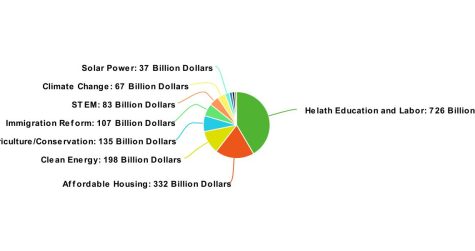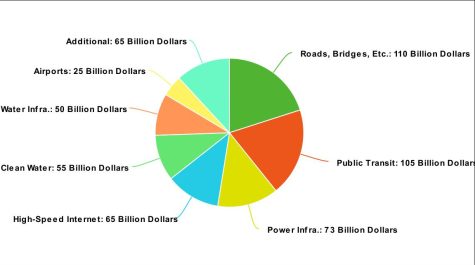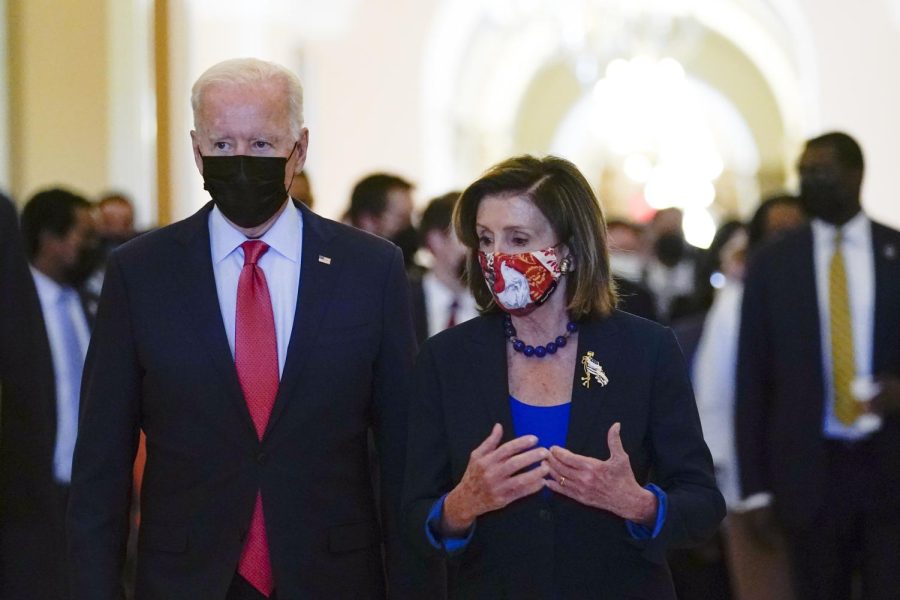Progressives and moderates battle over infrastructure bill
President Joe Biden walks with House Speaker Nancy Pelosi of Calif., on Capitol Hill in Washington, Friday, Oct. 1, 2021, after attending a meeting with the House Democratic caucus to try to resolve an impasse around the bipartisan infrastructure bill.
Oct 6, 2021
One and half trillion or three and half trillion dollars? This question is currently being worked on in the divided Democratic party. In the House of Representatives, progressive Democrats are pushing for a $3.5 trillion dollar spending package on top of the infrastructure package. This plan competes with moderate Democrats, who are working on a $1.5 trillion bill that has already passed the Senate with bipartisan support. The current bill is a result of months of negotiations between top Republicans and the Biden administration. The issue for the progressives is that their spending package will presumably receive no Republican support and is not favored by many moderate Democrats. The difference between these two packages is the extra spending on social issues and measures against climate change in the larger bill.

An infrastructure bill typically includes funding for roads, bridges, broadband and similar projects. This bill would be the biggest spending package for infrastructure in more than a decade. However, without the additional spending that the progressives were seeking, the wing of the party is hoping to add on with reconciliation. This is at odds with the bipartisan efforts of the infrastructure package because it would counter the negotiations made by both Republicans and Democrats. This situation is creating a divide amongst party members, where Republicans will not support the additional spending and Democrats do not want to delay the bill.
The progressive wing of the Democratic Party is effectively using their base to block the bill in order to shape the Democratic agenda. They are keeping with their threat to delay the infrastructure package if there was not a concurrent reconciliation bill. This is forcing House leadership to postpone a future vote, which the progressives are hoping to

influence other Democrats to support the reconciliation bill. This is effectively making the $3.5 trillion spending package the forefront of House proceedings. The current bill includes $1 trillion dollars in previously approved funding and $500 billion dollars in new spending. However, this does not include many of the social spending and initiatives that the progressive wing is striving for in the spending package. Sen. Bernie Sanders argued that $3.5 trillion “should be a minimum,” yet he stated, “I accept that there’s going to have to be give and take.”
The infrastructure bill was proposed by moderate Democrat Sen. Joe Manchin, who has been at odds with the progressive wing of the party many times before. Both him and Sen. Kyrsten Sinema are at odds with the progressives due to their refusal to support the additional spending. However, later on in the week, there will be a vote on a budget that will form a blueprint of the $3.5 trillion progressive spending package. This vote will show if the progressives were able to sway moderate Democrats to join in their efforts of more social spending.
Colin Swearingen, of the Political Science Department, stated that “There is no way there will be $3.5 trillion,” continuing, “we are looking at somewhere between $1.5 and $2.5 trillion…my guess is that it will be closer to 1.5 rather than 2.5 trillion.” The issue with this hold up from progressives is that it takes away from other Democratic priorities. The more time spent in negotiations for the spending package, the less time there will be for other parts of the Democratic agenda. Swearingen explained that “the infrastructure bill will pass, it will just be a matter of what is in the other bill.”
The coming weeks will be crucial for House leadership to work out the issues between the two sides of the party and push forward with other objectives.













